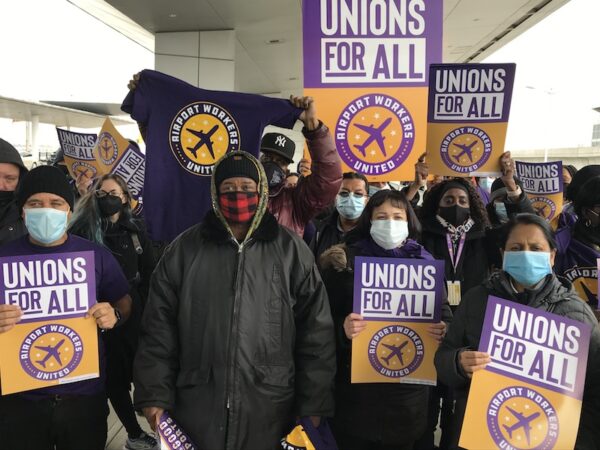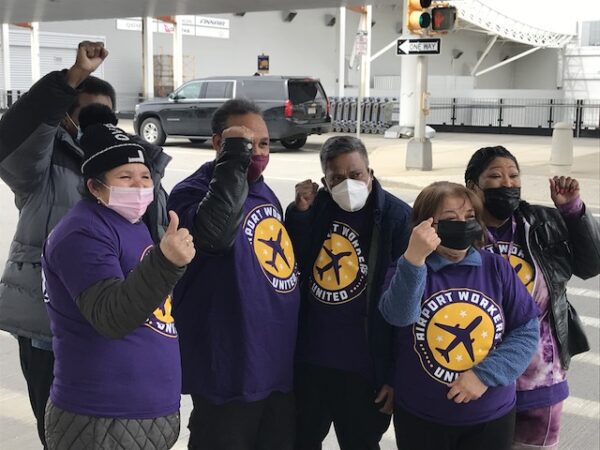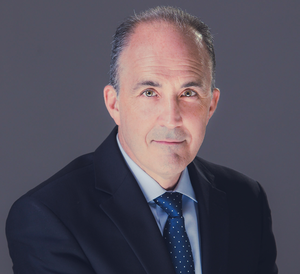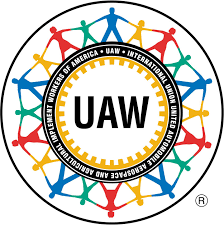NEW YORK, N.Y.— Airport contract workers rallied at John F. Kennedy international Airport March 30, part of a nationwide campaign to win living wages and the right to form a union at some 30 airports around the country.
With travel picking up as COVID rates are at least temporarily declining, airlines are “making so much money that the CEO of American Airlines just doubled his salary,” 32BJ SEIU Vice-President Rob Hill, director of the union’s airport division, told a group of workers outside American’s terminal at JFK. But airport workers in Florida and at Dallas-Fort Worth, he added, are making $8 an hour with no benefits.

The unions, 32BJ and Airport Workers United — SEIU’s campaign to organize airport workers, particularly in the South and Southwest — are demanding the big-three U.S. airlines, American, Delta, and United, sign a “Good Airports Pledge.” Its five points are for the airlines to acknowledge that they have the ability and responsibility to end poverty-wage jobs; to ensure that the billions of public dollars they receive serve the public good; to set a minimum wage and benefit standard that includes affordable, quality health care and paid time off; respect workers’ right to join in a union; and ensure that contracts with airport service providers are able to meet living-wage and fair-benefits standards and encourage contractors to be neutral when workers organize a union.
The unions are also demanding that JetBlue follow the principles in the Good Airports Pledge, although it was not one of the three airlines whose CEO received the letter directly.
The day’s events included rallies at airports in Newark, Charlotte, Los Angeles, Phoenix, San Francisco, Washington, and other cities. In Atlanta, workers marched to Delta’s corporate headquarters, and they also demonstrated outside the main offices of United offices in Chicago and American in Fort Worth, Texas.

Airport service workers such as cabin cleaners, wheelchair attendants, janitors, and security officers are generally employed by outside contractors. The system of outsourcing those services is a no-one-takes-responsibility-for-this business model. Airlines are not directly responsible for pay and benefits, because the workers are not their direct employees. They typically hire the lowest bidder to provide services, so contractors who cut labor costs have an advantage.
“We’re asking [the airlines] to bid the work out with a floor,” Hill told LaborPress. Airport workers in New York, New Jersey, and Philadelphia now have union contracts, but “that should be national. It’s not fair that a worker in New York makes $18 an hour and benefits, and you take the same flight to Charlotte and they’re making $8 with no health care.”
Workers in New York want to win paid vacation time next, says JFK cleaner Marina Stallings, speaking in Spanish through a translator. “For me, and for all of my compañeros.”
Vacations are also important to Saeed Bacchus, a security officer at JFK since 2008.
“It’s quite amazing that a lot of companies offer no paid vacation,” he says. Some don’t even want to give unpaid time off.
While rest, recuperation, and seeing family are essential, he continued, “you need time to enjoy the beauty of America.”
As a boy growing up in Guyana, he recalls, he read books about the natural wonders of Yellowstone Park and tales of the OK Corral.
“You want to see the Grand Canyon,” he told LaborPress.





